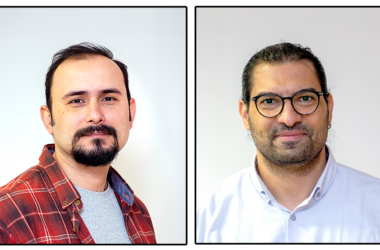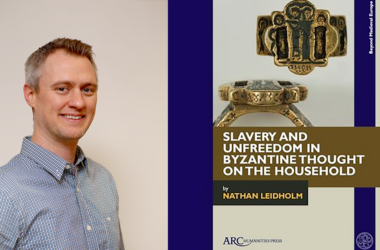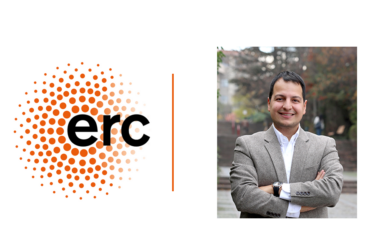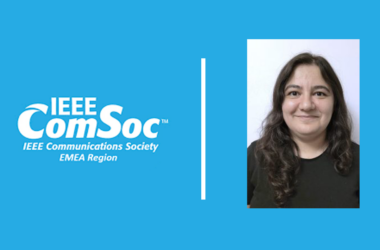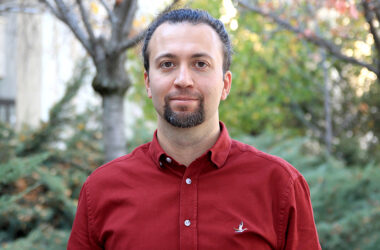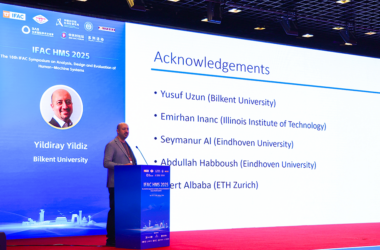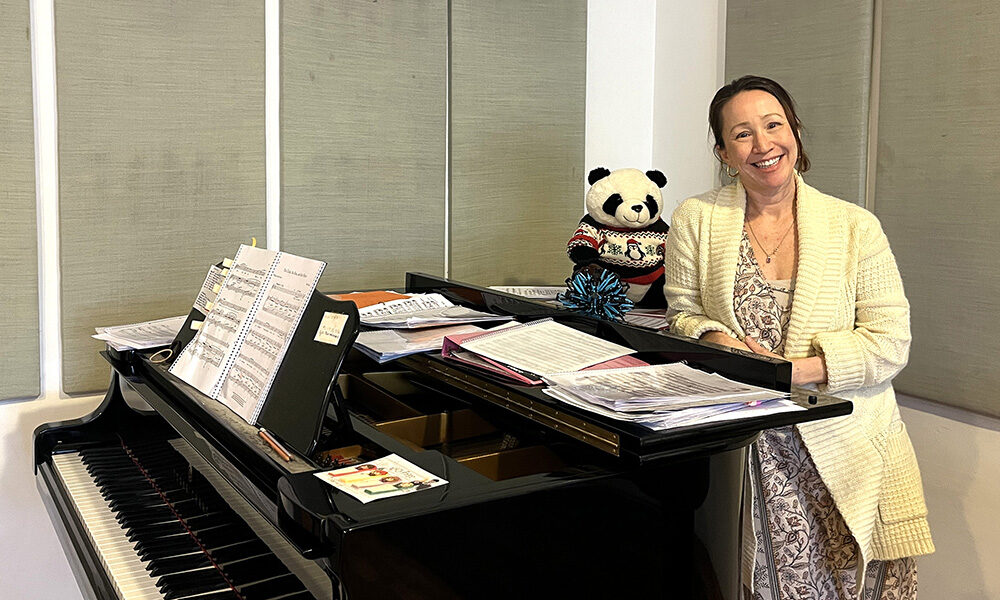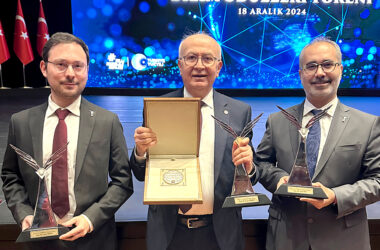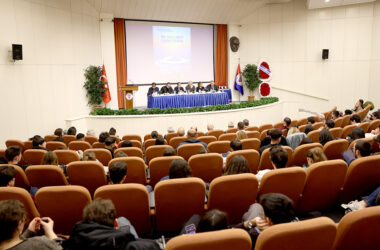BY EKİNSU POLAT (AMER/III)
Jennifer Leigh Tipton is an Assistant Professor in the Department of Music. She holds a Doctor of Musical Arts (D.M.A.) degree in Vocal Performance and Pedagogy from the University of Southern Mississippi.
Currently, Dr. Tipton is teaching MSC 150 (Singing for Theatre I), MSC 255 (Vocal Literature American/English/ Italian), and MSC 355 (Pedagogy I: Anatomy of the Voice).
What is one piece of information from your field that you think everyone should know?
That classical music and singing only appear to be fancy. However, they’re not; the reality of the life is not at all glamorous day to day. Whenever you see an opera or singers on stage, you can probably guarantee that the rest of the singers are dancing in completely funny ways in the back. So, it appears to be fancy and elegant, and it kind of is, but it’s also not.
When and where do you do your best thinking?
I like to run, not here necessarily, but I feel like a lot of ideas come to me when I run. And honestly, my brain moves in a bunch of different directions, so I get ideas randomly at any time. But if I’m trying to think about something, I probably won’t get the answer.
What distracts you?
Everything. Everything distracts me. Having a good idea about something I’m not focusing on distracts me. I get really distracted when I’m hungry. When it comes to music, or singing in general, I get really distracted watching singers try to be technically correct. If I feel like they’re not communicating authentically with me, then I just feel like they’re being dishonest and I immediately check out.
What are you most curious about?
Right now, I’m thinking a lot about diversity in music, not necessarily that of different cultures but of the diversity in music as in classical versus pop and the blurring of lines and how that joins. Sometimes concerts will be really classical and then they’ll follow up with something theatrical or pop-oriented at the end as if to say, “Here’s some pop to apologize for the classical.” Yet sometimes I feel like the pop deserves to be on the same stage as the classical; it just depends. I think there are boundaries that exist in the arts that are outdated.
What’s the most common misconception about your work?
That you can’t teach voice. I think people believe that you’re either a singer or you’re not a singer and that voice can’t be taught. This is completely incorrect. Some of my most successful students didn’t start like that at all. It’s very much a skill, just like anything else. So, in the way that not everyone is going to be like the gymnast Simone Biles, everyone can learn to do a cartwheel. Singing is the same way. There’s a proclivity for it, and some people will do better than others. Oftentimes the most talented students aren’t the ones that make it, and they aren’t the ones that are the best artists either. I think the most effective artists are the ones that are storytellers more than anything else.
What do you like to do when you’re not working?
I like to eat. I like to eat and drink foods and beverages from everywhere. I will try anything. I work out all the time, but that’s just part of my mental hygiene. I read a lot of books; that does not make me smart, but it makes me happy. This is how I spend almost all my spare time. If I’m at home, I have a book in my brain that is not at all smart.
Which books have influenced you the most and why?
There have been some vocal books that have influenced me, but those are really nuanced and science-based and difficult to read. I don’t even realize how much they influenced me. One book that influenced my thinking is “The Poppy War” by R.F. Kuang. It’s fiction, but the theme through the first book is that power dictates acceptability. I think about that a lot, and about what we teach, and why we teach, and the same ideas with classical music versus pop. Whoever is in control decides what we see as art. That quote influenced me a lot.
If you weren’t an academic, what career would you choose?
If I wasn’t an academic, I would still be singing or teaching. When I was in college, from a teenager all throughout my doctorate, I had a whole second career of coaching competitive gymnastics in America. I probably could have done more of that, or teach, or become a painter.
What is the secret of leading a happy life?
The secret to living a happy life is not letting other people dictate who you are. I don’t care too much about what other people think. I even tell my students that when I’m on stage now, if I sing badly… I’m sorry they came out and wasted their night, but it’s not my problem. So, I think the secret is having a lot of self-forgiveness and acceptance for yourself and not listening to other people tell you who you are.
If you go back to your undergraduate student years, what advice would you give to your younger self?
I did well as an undergraduate. I also argued with a lot of my teachers in my undergraduate years, but I was right. What bothers me now is that they were telling me I was wrong. I saw a lot of outdated teaching, and I questioned it. I was a single mom at the time, as I had my child when I was 18. I’m very proud of how I handled things, which was…I couldn’t fail.
Failing was not an option because I had a child. But I think it’s a lot of trusting yourself and trusting your gut. Also, don’t be afraid if you have ideas that are contrary to what your teachers tell you; a lot of times they’re worth exploring.
Why did you choose on academic career?
I’m usually very curious. In music particularly, singing and the voice never bore me. They are always a new puzzle, even though the pieces are the same. I like working with young people. A lot of people in my field just perform, which is great, but I don’t enjoy that. While it may seem glamorous, life as a performer is usually very lonely. It’s a lot of traveling and being alone in hotel rooms. When you sing everyone is excited, but then they forget about you. You only kind of know your colleagues. Teaching allows me to build and create community and see things grow. I enjoy having really talented colleagues to make music and converse with. I like the people that surround me and the influence that I can put out in the world.
What do you like the most about being at Bilkent?
The easiest answer is the cats. I always have cat treats in my pocket, and I love that I can pet a cat anytime. This is not something that happens in the US. My time here has given me a different insight. We look at the world the same, but there are nuances that change how I think about the voice. Technically speaking, the Turkish language lives in the mouth very differently from American English. The biggest culture shock I had when I came here was that it’s more community oriented. Americans are fiercely independent, to a fault. Here it’s expected that you ask for help, and it’s okay. That was really hard for me to figure out. This is a very different culture that’s a little more kind and a little more welcoming than what I’m accustomed to. I also see that with the cats, because we all relate to compassion. In the US, cats are taught to fear people, they don’t come up to you.
What projects are you working on currently?
I have a handful of different projects next week. I’m the advisor for the Music Theater Society so I’m singing a piece from Hadestown in Kannada in January. That’ll be fun. It’s going to be jazzy, a whole other thing. I’m also doing a small opera with Orchestra Miami in Florida, in which I get to play Cat. I can tell the conductor that this is my dream. In February, I’m doing a small recital with my voice department colleague and the pianist in collaboration with the film department and the literature department about short stories. The songs showcase short stories. Then in April, I’m doing a “tiny desk concert.” In the US, there’s a radio station that brings in big artists and they’re just at a desk and there they make music. So, it’ll be Adele just singing at a desk, and usually acoustic versions only. I’m going to do a recital of Nina Simone, Sufjan Stevens and Radiohead, but acoustic arrangements for a classical-ish voice. That’s the biggest thing I’m working on right now.
What’s your best work?
My students. Listen to them sing. That’s my best work.
What excites you about your work and what’s the coolest thing about your work?
When I’m teaching, every student is like having a makeover show, and that’s really fun. They will come in and make a new sound and I wonder, what is happening? And then you have to figure it out for better or worse. That’s always cool and exciting. Another cool thing is being able to make music with my colleagues. If I have any desire to sing something, they’ll say, yes, let’s make it happen. I decided a long time ago that I never wanted to be far away from a career that allowed me to make music with friends.
What has been the most exciting moments of your career so far? Could you share a turning point or defining moments in your career?
Some of the cooler moments in my career are from when I was teaching in Miami and I had my first group of really good singers. It was a series of successes, like the two years where they were just…we won everything. We won the competitions. Nobody is supposed to win and the students were getting calls, they were getting giant scholarships to Juilliard. That was really exciting. At that point, there weren’t good facilities where I taught. I was literally teaching out of a stairwell in downtown Miami with my phone and a speaker, yet we were starting to receive recognition all over the country.
One of the big turning points in my career was when I woke up to an email that was basically telling me that I was moving to Turkey. I had never been here before I got the job. That’s for movement across the world.
If you had unlimited funds, what would you like to do research on?
I have a couple theories about the voice, and I would need a voice laboratory to research them. These laboratories exist only at specific universities. I have specific theories about the correlation between music theater singing and classical singing and how they present in young singers.
